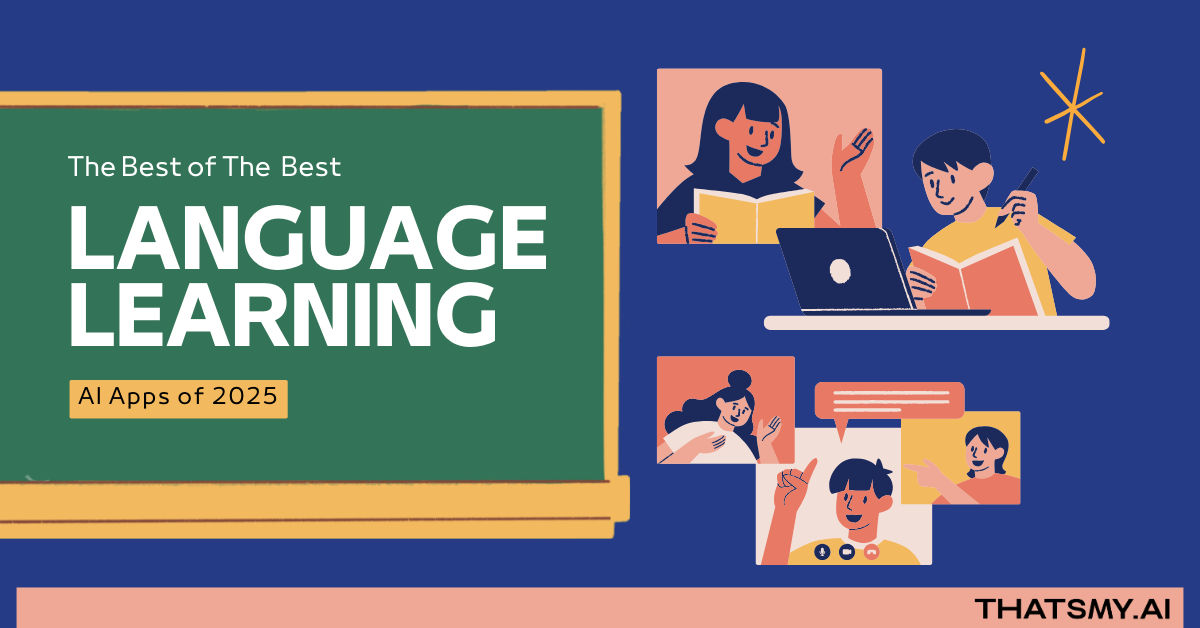Struggling to learn a new language? AI-powered tools can help you learn 10X faster with personalized lessons, real-time speech recognition, AI-driven flashcards, and immersive experiences. From Duolingo’s adaptive exercises to Mondly’s AI conversation partner, these apps provide smarter, more engaging ways to master a language. Whether you need pronunciation feedback, interactive writing assistance, or real-time translations, AI makes language learning effortless and fun. Dive in to explore the best AI-powered language learning apps and discover how they can accelerate your journey to fluency!

Have you ever dreamed of learning a new language but felt completely lost? Maybe you tried cramming vocabulary, tuning in to native speakers, or even signing up for language classes—only to find the process slow, exhausting, and downright frustrating. Trust me, you're not alone.
But what if language learning could be effortless, exciting, and fast? Thanks to artificial intelligence, mastering a new language is now easier than ever.
With some of the best language learning apps, you can get personalized lessons, real-time feedback, and immersive experiences that make learning up to 10 times faster.
Say goodbye to boring drills and hello to a more brilliant and engaging way to become fluent!
Let's dig deeper into how AI can energize your language-learning journey.
|
Best AI Language Learning AI Apps |
Top Features |
|
Duolingo |
Uses BirdBrain AI model to personalize exercises based on strengths and weaknesses. |
|
Babbel |
Babbel Conversation Practice offers real-world scenarios, conversation practice without preparation, and customizable learning styles. |
|
Rosetta Stone |
Immersive learning approach, simulates real-life scenarios, and enhances cultural understanding. |
|
Google’s Speech-to-Text |
Uses Chirp, a foundation model trained on millions of hours of audio data for speech recognition. |
|
Elsa Speak |
Real-time conversation practice with instant pronunciation feedback. |
|
Speechling |
Uses spaced repetition and AI-driven algorithms for pronunciation and listening practice. |
|
HiNative |
Community-based language learning with AI and native speaker assistance. |
|
Mondly |
Features Luna, an AI conversation partner for real-time language practice. |
|
Quizlet |
AI-powered Q Chat feature for interactive conversation, grammar feedback, and vocabulary improvement. |
|
Memrise |
Uses spaced repetition to optimize vocabulary retention and recall. |
|
LingQ |
AI-generated transcripts from audio content, simplifies complex texts, and identifies unknown words. |
|
FluentU |
AI-powered chatbot for listening comprehension and vocabulary improvement. |
|
Grammarly |
AI-driven writing assistant for rewording, grammar correction, and fluency enhancement. |
|
Quillbot |
Virtual reality-powered language immersion with real-time conversation practice. |
|
Mondly VR |
Virtual reality-powered language immersion with real-time conversation practice. |
One of the harshest language challenges is determining the right learning style. This is highly subjective, implying that what works for one person might not work for another.
This is where AI can help. Today, we have some of the best language learning apps, like:
In Duolingo, an AI model called BirdBrain ensures that the exercises you see on the platform are at the precise difficulty level based on your strengths and weaknesses. It uses a large language model to predict the most likely way to complete a text string.
This tool has a unique AI feature called Babbel Conversation Practice. This helps you with
a variety of real-world-inspired scenarios,
converse without extensive preparation and
liberty to select your preferred learning style.
You can choose from many situations, from doctor’s appointments to visiting a mall.
This tool excels in immersing the language learning approach. You can
walk the streets of Barcelona,
interact with locals, and
experience the magic of authentic Spanish conversation.
The AI technology used by Rosetta Stone helps stimulate real-life scenarios, immerse learners and cultural nuances, and provide a cohesive language learning experience.
These tools analyze your learning patterns and create a customized plan. They can fix lessons based on your progress, ensuring you're constantly challenged to do better but never feel overwhelmed.
For instance, the AI will give you more practice lessons if you struggle with verbs, nouns, adverbs, and other grammatical conjugations. Similarly, if you're great at vocabulary but weak in pronunciation, it will emphasize helping you augment your speaking skills.
AI language learning makes a foreign language feel easy, natural, and not like a chore.
Conversing in a new language is often the most challenging part. We put much effort into its accent, pronunciation, and whether native speakers will understand us.
AI shines at this place, too. We have a few best language learning apps, such as:
This vital tool by Google uses Chirp, the company's foundation model for speech, trained on millions of hours of audio data. This contrasts with traditional speech recognition tactics, whichasizing large amounts of language-specific supervised data.
Similar to other AI language learning apps with Elsa AI, you can choose the type of situation you wish to practice and have real time conversation. You also receive immediate feedback from the app based on your performance.
This tool capitalizes on space, repetition, and sophisticated algorithms to let users practice from thousands of sentences with authentic voices.
These AI tools utilize modern speech recognition tools to interpret your pronunciation and provide instant corrections.
Imagine you are practicing German and say, "Ich heisse Daniel." The AI tool will listen to it carefully, identify pronunciation mistakes, and provide feedback on improving yourself.
Some of these best language learning apps even compare your voice to native speakers so that you can hear the difference and adapt accordingly.
This equals having a personal language coach 24×7.
What if we tell you that you can practice conversations anytime and anywhere? Well, now you actually can. And a big thanks to AI Chatbots and Real-time translation tools for making this possible. AI tools helpful in this regard are:
It is an application for community-based language learning, and you get answers to your questions from AI and native speakers.
This language learning app developed by Pearson also introduced Luna, an AI conversation partner, in 2023. Luna can speak over you, try to complete your sentence, and adjust according to real-time situations.
These are some of the best language learning apps that allow you to chat with AI-enabled tutors, who can further stimulate real-time conversations in your target language. With these apps, you can ask questions, practice dialogues, and act in different situations, like ordering food at a restaurant, buying groceries, or booking a hotel room.
Even better, AI tools like Google Translate and DeepL help you translate sentences instantly. So, if you get stuck in a sentence or a phrase, you can quickly comprehend its meaning and keep the conversation going.
This all-inclusive experience with AI language learning speeds up your memorizing process by making it feel natural and interactive.
One of the most essential parts of learning a language is memorizing new words. But to be frank, cramming vocabulary and new words can be uninteresting and ineffective.
Some of the best language learning apps use spaced repetition. This implies they show you words just when you are about to forget them. It is one such process that helps you remember faster and longer.
For example, if you struggle to remember the French word "Crossaint," the application will show it to you more frequently until you excel in it. Once you're done, the repetition gradually expands so you don't forget that word.
This is one of the most innovative systems that ensures you retain information without wasting time on words you already know.
Thanks to technology, we have AI-Powered flashcards like:
The tool has a feature called Q Chat that can instrumentally help in language learning.
It provides
interactive conversation,
personal feedback and
constructive advice on grammar and vocabulary.
By adapting to learners individual needs, it helps to improve fluency and comprehension.
Similar to Quizlet, it also personalises your study plan by using space repetition. It detects words you struggle with and presence them for review at optimal intervals.
It is a known fact that we learn best when we are engaged. Nothing is more interactive and engaging than real-life content.
AI can suggest content based on your personal interests and skill set. For this, we have platforms like:
LingQ AI assists learners by automatically producing transcripts from audio content like podcasts or videos. This helps simplify
complex texts to make them more accessible, identifying words that are unknown within a text for easier vocabulary acquisition, and
providing personalized learning paths.
This has an AI-powered Chatbot that helps you improve your listening comprehension and vocabulary after a few videos.
These tools capitalize on artificial intelligence to provide videos, podcasts, and articles in your target language. They also have features related to subtitles and translations.
Imagine watching an Italian movie with engaging subtitles. You can click on a word you're unfamiliar with, instantly understand its meaning, and even pronounce it correctly.
This way, you'll learn the language fun and naturally, how children pick up languages by listening and learning.
Writing in a completely new language can be tricky. Grammar, sentence structure, and word selection can make it difficult to express yourself.
AI writing tools like Grammarly and Quillbot assist you in checking your grammar and suggest areas of improvement.
If you write an email in French or an essay in Spanish, these tools can instantly correct your mistakes and offer better word choices.
You'll learn from your errors and improve your writing skills with real-time feedback.
Imagine walking into a virtual Rome, a cafe in Paris, or ordering a coffee in Berlin without leaving your home.
Mondly VR is an AI language learning app powered by Virtual Reality that can help you
practice real-time conversations in a simulated environment,
generate an immersive learning experience, and
make the language feel more pragmatic and natural.
Research has shown that interactive learning helps you retain information better and for longer. Therefore, the next time you practice speaking in a foreign language, you can put on a virtual reality headset and delve into a real-world scenario.
Although the answer to this question entirely depends on your requirements, we can confirm that if you need personalized study plans, you should go with the best language learning apps, like Duolingo, Babbel, and Rosetta Stone. If you want to improve your speaking skills, smart speech recognition tools like Esla Speak and Speechling can help.
While AI-powered flashcards expedite your vocabulary memorizing process, AI-enabled writing assistance tools, like Grammarly, help you learn from your mistakes. Therefore, you can analyze your priorities to decide what is the best language learning app for you.
Even a few years ago, learning a new language was slow, boring, time-consuming, and frustrating. But with the arrival of artificial intelligence, we now have more imaginative, faster, and more interesting ways to be outstanding at learning a new language.
From customized lessons and instant feedback to immersive experiences and AI flashcards, nearly numerous artificial intelligence techniques can help you learn 10 times faster. Your coach may get tired, but AI will not. Nor is AI going to judge you for your silly mistakes. It will always be there to support you.
If you are serious about learning a new language, try an AI language learning app. The future of language learning is here, and it's more thrilling than ever.
What language do you want to learn next?
Sign up to gain AI-driven insights and tools that set you apart from the crowd. Become the leader you’re meant to be.
Start My AI Journey
ThatsMyAI
20 August 2024

ThatsMyAI
19 July 2024

ThatsMyAI
27 June 2024